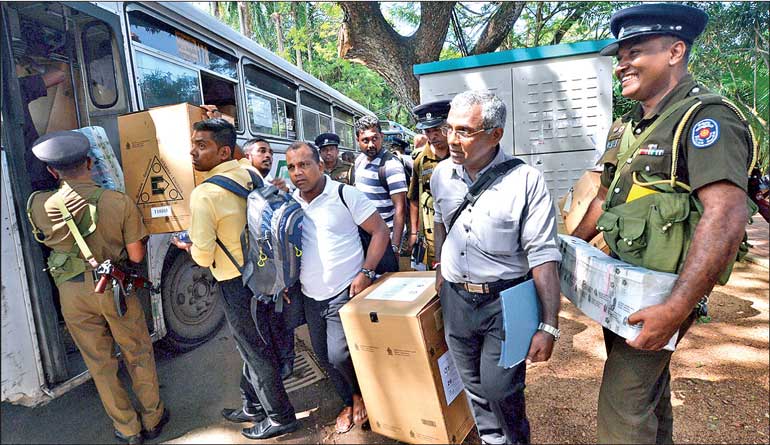Tuesday Feb 24, 2026
Tuesday Feb 24, 2026
Friday, 3 March 2023 00:20 - - {{hitsCtrl.values.hits}}

If the Government in Sri Lanka is preventing elections from being held by claiming that there is no money to fund them, this could be considered a violation of the democratic process – Pic by Shehan Gunasekara
 In Sri Lanka, Article 148 of the Constitution states that ‘Parliament shall have full control over public finance’. The Minister of Finance, as a Member of Parliament, is responsible for presenting the annual budget to Parliament for approval and for implementing the budget once it is approved.
In Sri Lanka, Article 148 of the Constitution states that ‘Parliament shall have full control over public finance’. The Minister of Finance, as a Member of Parliament, is responsible for presenting the annual budget to Parliament for approval and for implementing the budget once it is approved.
Once the budget presented by the Finance Minister is approved by Parliament, the Finance Minister cannot decide, on his own accord, not to release funds for an approved purpose. The budget is a legally binding document that outlines the Government’s revenue and expenditure plans for the fiscal year, and it is the responsibility of the Finance Minister to ensure that the funds are allocated according to the approved budget.
The Constitution of Sri Lanka provides for the establishment of an Election Commission, whose members are appointed by the President of Sri Lanka, subject to the approval of Parliament. The Election Commission is an independent body that is responsible for holding elections and ensuring that they are conducted in a free and fair manner. It operates independently and has the authority to carry out its duties without interference from Parliament.
The funding required by the Election Commission to carry out its duties is approved every year through the normal budgetary process. This ensures that the Commission can operate independently and without any undue influence from Parliament. However, the President of Sri Lanka, who also happens to be the Finance Minister, thinks otherwise. He has refused to release funds allocated in the budget to the Election Commission to hold the upcoming local government elections. His statements in this regard are quite bizarre, as if he is the only person in the country who doesn’t accept that there is an ongoing election process. This is despite the fact that his own political party the UNP has submitted nominations for several councils.
Despite difficulties the President is trying to convince the public of, it is not at all uncommon for the Government to borrow money in order to cover budget approved expenditures. The 2023 budget has allocated only Rs. 10 billion for the upcoming local government elections, which accounts for a mere 0.17% of the total approved government expenditure of Rs. 5.8 trillion for the same year.
Raising Rs. 10 billion is not a significant challenge for the Government. For instance, during the weekly Treasury bills auction held by the Central Bank on 15 and 22 February, a total of Rs. 133 billion was raised while the bids received were worth Rs. 185 billion, indicating that the Government could have easily raised the required funds for the election. Similarly, on 27 February, the Government raised Rs. 20 billion through Treasury Bids, while there were bids worth Rs. 61 billion.
In addition, the Election Commission has stated that the immediate requirement for the election is only Rs. 1.1 billion, which is just a fraction of the allocated budget. Therefore, there is no need for the Government to provide all the funds at once. The rest of the payments can be made between governments and can wait. This clearly indicates that the Government can easily raise the necessary funds for the election if it genuinely intends to respect the Constitution and uphold the right to vote. If the Finance Minister fails to release funds to the Election Commission that have been allocated in the budget, it would be a violation of the Constitution and the law. It would also breach the trust between the Government and the people, as the budget reflects the Government’s commitments to provide public services and meet the needs of the citizens.
The Election Commission has brought the matter to the attention of the Speaker, requesting him to intervene. While the Speaker does not have direct powers to release allocated funds, he can play an important role in ensuring that the Government is held accountable for its actions and that the interests of the people are protected. The Speaker can allow for a parliamentary debate, refer the matter to the relevant Parliamentary Committees, and hold the Minister in Contempt of Parliament if the Minister’s actions are deemed to be a violation of parliamentary rules or if the Minister fails to comply with the directions of the Speaker or the Committee.
However, the effectiveness of the Speaker in performing his duties may be compromised in Sri Lanka’s political setup, where the independence of high officials has often been compromised through indirect means.
If the President, exploiting his portfolio of Finance Minister, refuses to release funds for holding elections, this could prevent the Election Commission from carrying out its constitutional mandate, which could infringe on the rights of MPs and citizens to participate in the democratic process. MPs have the privilege of free speech, freedom from arrest, and immunity from legal action for any statements made or actions taken in the course of their parliamentary duties. Therefore, it is the responsibility of all MPs to raise the issue in Parliament and demand that the Finance Minister releases the necessary funds to the Election Commission. The Committee on Public Finance is a standing committee of Parliament that is responsible for examining and reporting on the budget and public expenditure. The Committee has the power to summon any person or authority to appear before it and give evidence. Even if the speaker is avoiding action in this regard, the Committee on Public Finance in Sri Lanka can summon the Secretary to the Treasury and question him regarding the allocation and release of funds for elections or any other matter related to public finance. By summoning key officials and questioning them on matters related to public finance, the Committee can help to promote greater accountability and ensure that public resources are used for the benefit of the people.
The Committee can investigate the matter and make recommendations to Parliament or the government on how to address the issue. However looking at the events unfolding over the last few weeks it is likely that the government would try to keep the chairmanship of the Committee on Public Finance with a supporter of the Government. If the Government retains the chairmanship of the committee, it may be able to influence the committee’s decisions and prevent it from carrying out its mandate effectively.
Elections are a fundamental aspect of any democratic system, and they provide citizens with the opportunity to exercise their right to vote and choose their representatives. If the Government in Sri Lanka is preventing elections from being held by claiming that there is no money to fund them, this could be considered a violation of the democratic process. The failure to hold elections could result in a breakdown of the democratic process and could lead to instability and unrest. That can have serious repercussion in future and everyone is going to lose in the long run. That is why the citizens, civil society organisations, and other stakeholders should speak out against such actions and demand that the Government take steps to uphold the democratic process.
As Abdul Kalam, former President of India once said, “Democracy is not perfect, but it is the best system that we have to ensure justice, equality, and freedom for all.”
(The writer is a Member of Parliament.)